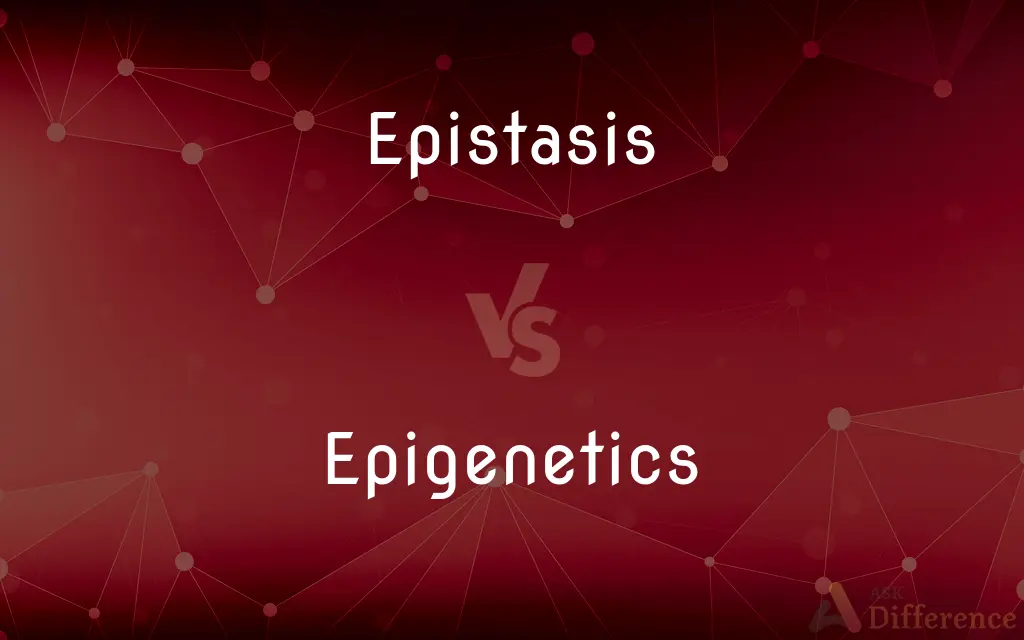Epistasis vs. Epigenetics — What's the Difference?
By Tayyaba Rehman & Urooj Arif — Updated on April 27, 2024
Epistasis involves interactions between different genes affecting a trait, whereas epigenetics refers to changes in gene expression not involving alterations to the DNA sequence.

Difference Between Epistasis and Epigenetics
Table of Contents
ADVERTISEMENT
Key Differences
Epistasis occurs when the effect of one gene is dependent on the presence of one or more 'modifier genes'. Its impact is primarily seen in the genetic expression of traits, where the expression of one gene can be masked or altered by another. On the other hand, epigenetics deals with changes in gene activity and expression that do not involve alterations to the DNA sequence itself. This includes mechanisms like DNA methylation and histone modification.
In epistasis, the interactions can significantly complicate the inheritance patterns of certain traits, as these interactions can influence phenotypic outcomes in ways that are not predictable by simple Mendelian genetics. Whereas, epigenetics can be influenced by environmental factors, and these changes can potentially be reversible or persist through cell divisions, and sometimes even across generations.
The study of epistasis is crucial in understanding complex genetic diseases and traits, which involve multiple genes that interact in non-linear ways. On the other hand, epigenetics plays a key role in development, cellular differentiation, and adaptation to environmental changes, influencing processes from embryonic development to the adaptation of organisms to their environment.
Epistasis provides insights particularly into the genetic architecture of traits, including how genes interact in networks that influence phenotypic outcomes. In contrast, epigenetics is more about the regulatory layers that control the potential expression of genetic information encoded in DNA, without changing the DNA sequence itself.
In terms of practical applications, understanding epistasis can improve genetic models of inheritance and assist in breeding programs and genetic engineering. Meanwhile, epigenetics has significant implications for medicine and therapy, offering potential strategies for modifying gene expression in diseases.
ADVERTISEMENT
Comparison Chart
Definition
Interaction between genes affecting a trait
Changes in gene expression without DNA changes
Key Mechanisms
Gene-gene interactions
DNA methylation, histone modification
Influence on Genetics
Complicates genetic inheritance patterns
Affects gene activity and expression
Dependence on Environment
Less directly influenced by environment
Often influenced by environmental factors
Reversibility
Generally stable
Can be reversible
Compare with Definitions
Epistasis
Genetic phenomenon affecting phenotypic expression of genes.
Epistasis can complicate predictions in genetic crosses.
Epigenetics
Modification of gene expression without DNA sequence changes.
Epigenetics explains how twins can have different health outcomes.
Epistasis
Modifier gene interaction impacting another gene's effect.
In some flowers, epistasis determines petal color.
Epigenetics
Plays a role in disease and development.
Epigenetic mechanisms are crucial in cancer development.
Epistasis
A factor in complex genetic disorders.
Understanding epistasis is essential in studying diseases like cystic fibrosis.
Epigenetics
Involves mechanisms like DNA methylation.
DNA methylation in epigenetics can silence genes.
Epistasis
Influences genetic traits in a non-additive manner.
Epistasis plays a crucial role in the genetic complexity of height.
Epigenetics
Affects phenotypic traits without altering genetic code.
Epigenetic changes can lead to different flower colors in the same species.
Epistasis
Interaction between genes where one gene masks the effect of another.
In Labrador retrievers, the gene that controls fur color is epistatic to the gene that controls color darkness.
Epigenetics
Can be influenced by lifestyle and environmental factors.
Diet and stress levels can cause epigenetic changes.
Epistasis
Epistasis is a phenomenon in genetics in which the effect of a gene mutation is dependent on the presence or absence of mutations in one or more other genes, respectively termed modifier genes. In other words, the effect of the mutation is dependent on the genetic background in which it appears.
Epigenetics
In biology, epigenetics is the study of heritable phenotype changes that do not involve alterations in the DNA sequence. The Greek prefix epi- (ἐπι- "over, outside of, around") in epigenetics implies features that are "on top of" or "in addition to" the traditional genetic basis for inheritance.
Epistasis
An interaction between nonallelic genes in which the genotype at one locus affects the expression of alleles at another locus.
Epigenetics
The study of heritable changes in gene expression that are caused by factors such as DNA methylation rather than by a change in the sequence of base pairs in DNA itself.
Epistasis
A film that forms over the surface of a urine specimen.
Epigenetics
(genetics) The study of the processes involved in the genetic development of an organism, especially the activation and deactivation of genes.
Epistasis
The suppression of a bodily discharge or secretion.
Epigenetics
(genetics) The study of heritable changes caused by the activation and deactivation of genes without any change in DNA sequence.
Epistasis
(genetics) The modification of the expression of a gene by another unrelated one.
Epistasis
The suppression of a gene by the effect of an unrelated gene
Common Curiosities
How does epistasis affect genetic traits?
It can alter expected outcomes in genetic inheritance, making certain traits appear or disappear depending on the interactions between different genes.
What are common epigenetic mechanisms?
Common mechanisms include DNA methylation and histone modification, which regulate gene expression without altering the DNA sequence.
What role does epistasis play in evolution?
Epistasis can influence evolutionary processes by enabling complex traits that may offer adaptive advantages or disadvantages.
Is epistasis common in all organisms?
While epistasis is common, its complexity and prevalence can vary widely among different organisms.
What are the health implications of epigenetics?
Epigenetics has major implications for understanding diseases, including cancer, mental disorders, and the impact of environmental exposures on health.
Does epistasis affect drug efficacy?
Yes, epistatic interactions between genes can influence how individuals respond to drugs, affecting drug efficacy and safety.
What is epigenetics?
Epigenetics involves changes in gene expression caused by mechanisms other than changes in the underlying DNA sequence.
Can epigenetic changes be inherited?
Yes, some epigenetic changes can be passed down to subsequent generations, although they can also be reversible.
What is epistasis?
Epistasis refers to the interaction between genes where the action of one gene is modified by one or more other genes.
How does epistasis complicate genetic counseling?
It makes predicting genetic risks and inheritance patterns more challenging due to the complex interactions between genes.
What research methods are used to study epigenetics?
Techniques like bisulfite sequencing, chromatin immunoprecipitation, and next-generation sequencing are commonly used to study epigenetic changes.
Can epigenetic changes be reversed?
Yes, unlike genetic mutations, some epigenetic changes are reversible, offering potential therapeutic targets.
How do environmental factors influence epigenetics?
Environmental factors like diet, stress, and exposure to toxins can lead to epigenetic changes that affect gene expression.
What practical applications does epigenetics have?
It has applications in medicine, agriculture, and understanding developmental processes, with potential for therapeutic interventions.
How is epistasis detected in genetic studies?
It is detected using statistical models and genetic interaction studies, which analyze how gene pairs affect phenotypic traits.
Share Your Discovery

Previous Comparison
Passover vs. Communion
Next Comparison
Historiography vs. HistoryAuthor Spotlight
Written by
Tayyaba RehmanTayyaba Rehman is a distinguished writer, currently serving as a primary contributor to askdifference.com. As a researcher in semantics and etymology, Tayyaba's passion for the complexity of languages and their distinctions has found a perfect home on the platform. Tayyaba delves into the intricacies of language, distinguishing between commonly confused words and phrases, thereby providing clarity for readers worldwide.
Co-written by
Urooj ArifUrooj is a skilled content writer at Ask Difference, known for her exceptional ability to simplify complex topics into engaging and informative content. With a passion for research and a flair for clear, concise writing, she consistently delivers articles that resonate with our diverse audience.













































